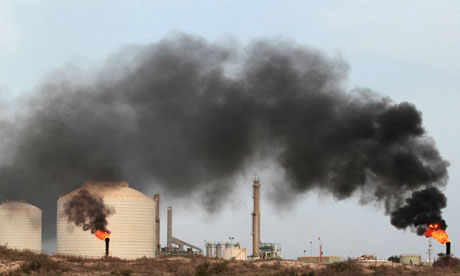The media has focused on front lines in the Libyan conflict, but fuel supplies are far more likely to be the decisive factor
By Oliver Miles

By Oliver Miles

Gaddafi's forces were beaten by rebels in a battle for this oil terminal in Zuetina, 850km east of Tripoli. Photograph: Suhaib Salem/Reuters
According to a Reuters report on 20 June, the Libyan rebels in Jebel Nafusa, south of Tripoli, have shut off the pipeline that brings crude oil from the far south-west to the refinery at Zawia, on the coast just west of Tripoli. This report, which seems to be confirmed, is important.
Media coverage of the fighting in Libya has concentrated on various front lines which are themselves of not much significance, given that most of the country is desert. It makes more sense to think in terms of lines of supply. The recent blacklisting of six Libyan ports is far more significant than quite dramatic movements up or down the desert road.
A recent incident in which civilians including children were killed by a Nato strike has rightly been strongly criticised. The UN mandate is to protect civilians, and any killing of civilians is not only tragic in itself, but calls into question the justification for the action.
However, a second incident in which the Gaddafi regime said that 19 civilians were killed in the home of Khouildi Hamidi outside Tripoli is probably of a different nature. Hamidi is one of the 12 original members of the Revolutionary Command Council, his family includes senior military officers, and the building was generally known to be a military command centre.
Alongside the reaction from the Italian foreign minister ("You can't run the risk of killing civilians, this is something that is absolutely unacceptable"), the secretary-general of the Arab League and others, it is worth quoting the London representative of the Transitional National Council, who said on 6 June that international intervention had prevented a mini-Rwanda, and Libya was grateful.
Dr Ali Tarhuni, minister for finance and oil, also wrote in an open letter on 20 June:
"Here in Benghazi we cannot sufficiently express our gratitude for the support the UK has extended to Libyans during our struggle against the tyrannical regime of Muammar Gaddafi. Together with her international partners, the UK has played a leading role in this defining battle for a free Libya. No one will ever forget this act of generosity and support for a democratic state."
Apart from the fighting, some attention has been paid to the question of oil exports, on which Libya normally lives. The rebels in Benghazi have succeeded in getting at least one tanker load away. This is important in relation to their most pressing problem, a shortage of cash. Gaddafi's forces have prevented more exports by destroying a pumping station which brings oil from the far south-east to an export terminal east of Benghazi, and more recently by attacking the oil fields themselves.
Nothing seems to have been said by the British government or Nato about this. These targets, and towns such as Jalu and Kufra where there has been fighting, are far away, and therefore more difficult, but they are important and ought not to be forgotten.
Paradoxically, the rebels are unable to get their hands on Libya's many billions of dollars, which are either in the Central Bank in Tripoli or frozen outside the country. At present the lawyers are baffled as to how to unfreeze them.
What has been overlooked is the straightforward issue of supply. One of the main complaints of the civilian population in Tripoli in recent months has been enormous queues for petrol. Why? Presumably existing stocks have been commandeered by the military, who need large quantities of petrol and diesel to operate, especially with tanks.
Tripoli's main supplies of oil products, including both petrol and diesel and also fuel oil for the main power station, come from the refinery in Zawia. It was damaged in earlier fighting, and is reported to be operating at about one-third capacity. It depends on crude oil supplies either by sea or by the pipeline from the south.
Supplies by sea have been cut off, although attempts to evade the blockade continue. Smaller quantities coming overland from Tunisia and Algeria have been pretty well closed down. If the pipeline remains closed, as now seems likely, Tripoli will run out of the fuel it needs to fight, and may also be blacked out.
There are some complications. Tripoli may still have some stocks of oil products. There is a second pipeline further west, close to the Algerian border, which supplies some oil to the coast, but that has also been shut down at source. Without power, water and sewage services would be affected, but some electricity generation capacity operates on gas, and gas supplies have not been interrupted.
Consumption of fuel by the military will have fallen as the war has become more static. The impact on the civilian population, already showing signs of discontent, may be more severe.
It is, as usual, not simple to predict the outcome. I would expect more serious fighting in the Jebel Nafusa area and along the western border, with Gaddafi's forces seeking to regain control of the pipeline and to reopen the second pipeline; they will probably find both impossible. I would also expect more draconian controls on civilian use of fuel in Tripoli, which will increase the pressure on the population.
But this may be the endgame. It is possible that lack of fuel will be the decisive blow against Gaddafi, and that it may not take more than a matter of weeks to be effective.
-This commentary was published in The Guardian on 24/06/2011
- Oliver Miles is a retired British diplomat and the chairman of MEC International
- Oliver Miles is a retired British diplomat and the chairman of MEC International
No comments:
Post a Comment